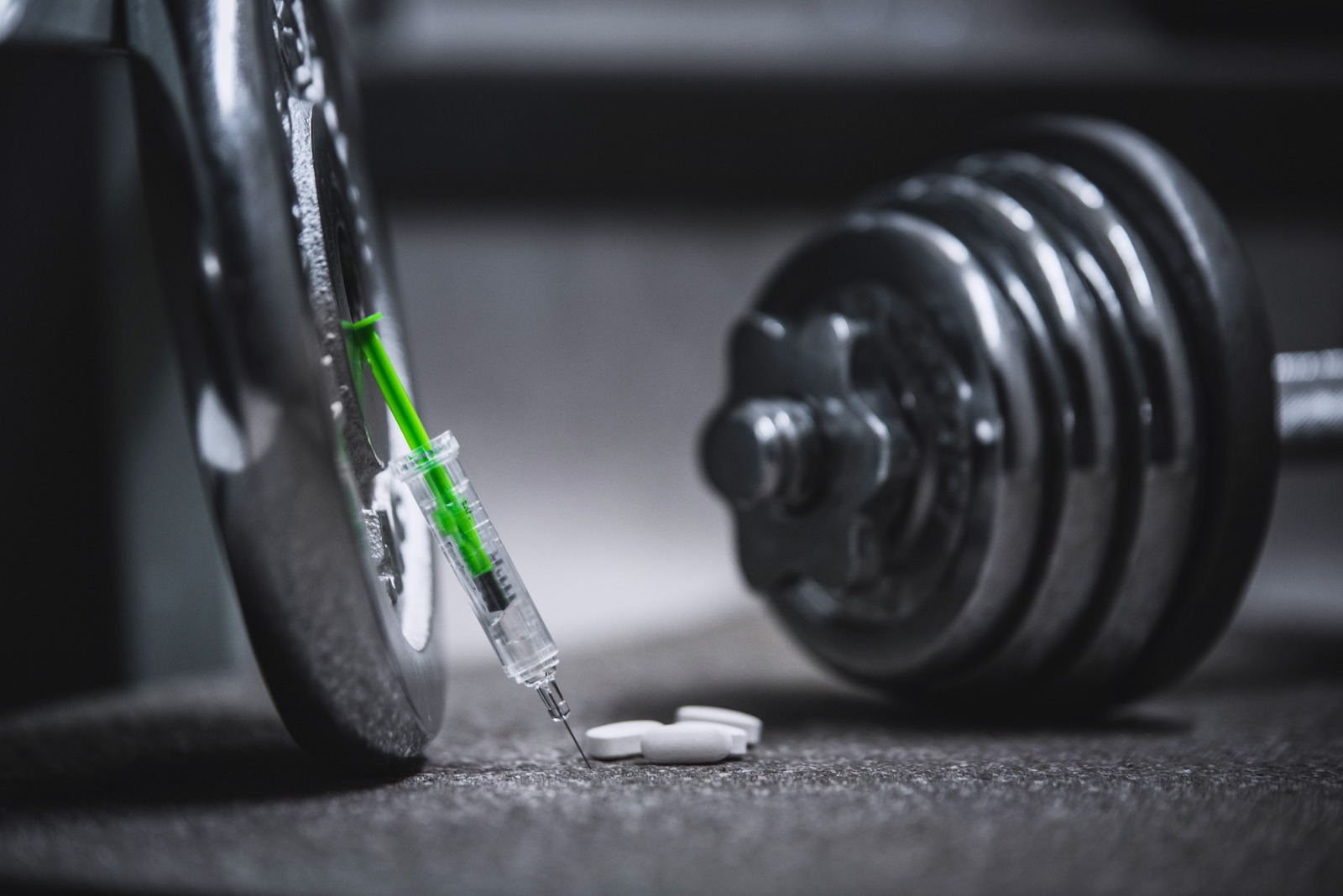Substances | 4 min read
Can You Drink on Steroids: Risks and Considerations
Medically Reviewed By

On March 11, 2024
Written By
On March 11, 2024

What you will learn
- Anabolic-androgenic steroids are abused for performance benefits, often in young men.
- Steroid use often co-occurs with other substance use, including alcohol.
- There are serious risks to combining alcohol and steroids, including heart, liver, and mental health risks.
- Addiction to steroids, alcohol, or both substances may require a medical detox to manage withdrawal.
Though anabolic-androgenic steroids are not as common as some other illicit substances, they are abused by people looking for performance benefits – particularly younger men. It’s also common to see other drugs of abuse combined with steroid use, including cocaine, painkillers, amphetamines, and alcohol.
Drinking alcohol on steroids comes with serious risks, including risks to your heart and liver health, as well as serious side effects. Learn more about steroids-alcohol interaction, drinking on medication, and responsible alcohol use while on steroids.
What Are Anabolic-Androgenic Steroids?
Anabolic-androgenic steroids, or simply “steroids,” are appearance- and performance-enhancing drugs (APEDs) that are synthetic drugs that mimic testosterone, the male sex hormone, to improve muscle-building effects and male sexual characteristics.
While anabolic steroids have a legitimate use in medicine to treat hormonal issues, they’re often abused in large doses to increase muscle mass, reduce body fat, and enhance athletic performance. Steroids may be called “roids,” “juice,” “andro,” or “stackers.”
Both anabolic and corticosteroids are often referred to as “steroids,” but they’re quite different. Corticosteroids are used in medicine to fight inflammation and are rarely abused. Female hormones, such as estrogen, are also used for legitimate medical purposes and aren’t likely to be abused.
Statistics on Steroid Use
Steroids and other performance-enhancing drugs were once limited to sports, but a wider spectrum of the population now uses them. The lifetime prevalence of anabolic steroid use worldwide is estimated to be about 1% to 5%.[1]
Because of the growing abuse, the Anabolic Steroid Control Act of 2004 amended the Controlled Substances Act to include testosterone and other steroids.[2]
Many people who use steroids do so to improve their performance or appearance. Some steroid users may suffer from body dysmorphia, which is a mental health condition that involves an obsessive focus on a perceived flaw in one’s appearance.[3] Most steroid use is seen in male weightlifters in their 20s or 30s.
However, some people abuse steroids for more practical purposes, such as security personnel looking to enhance their size and present a more intimidating appearance.
Can You Drink On Steroids? Steroid-Alcohol Interaction
There’s a link between people who use anabolic steroids and other substances, including alcohol.[4] However, steroids can cause alterations in the brain that can make you extremely sensitive to alcohol use, leading to greater and greater alcohol intake to achieve its intoxicating effects.
Combining alcohol and steroids can lead to liver damage, including cirrhosis and fatty liver, and exacerbate the risk of high blood pressure, irregular heartbeat, heart attack, and alcoholic hepatitis. Other potential risks include cardiomyopathy, stroke, pancreatitis, jaundice, and an increased likelihood of suicidal thoughts. While alcohol use is associated with tendon rupture, fluid retention, and certain cancers, the specific link between these conditions and combined alcohol and steroid use requires further research.
Steroid and Alcohol Abuse Among Teens
Mixing steroids and alcohol is risky for anyone, but the risks for teens are much greater. Because they’re in a physical and mental development period, teens who abuse anabolic steroids are more likely to experience stunted growth and changes to the puberty process.
Teens are also more fragile when it comes to body image, which may prompt them to use steroids in the first place. Teen boys who use steroids are more likely to have depression, low self-esteem, unhealthy eating habits, and co-occurring substance abuse.[5]
Regrettably, drinking alcohol is an issue among teens as well. Teens who drink under the age of 15 are four times more likely to develop dependence.[6] They also drink less frequently than adults, but they are more likely to binge and be at risk for alcohol poisoning.
Are Steroids Addictive?
Anabolic steroids are Schedule III substances with a moderate-to-low potential for physical or psychological dependence. However, research shows that about 32% of individuals who misuse anabolic steroids will become dependent, and an unknown number may develop an addiction to steroids.[7]
Identifying anabolic steroid use problems can be challenging because they’re not taken for an immediate high. They’re taken on a set schedule over a specified period of time to bring muscle gains and fat loss. While this is accelerated, it’s not an overnight change.
The signs of steroid addiction may include:[8]
- Increase in aggressive behavior
- Manic state
- Psychosis (rare)
- Increased risk of suicide
- Dependence and withdrawal
In men, steroids can cause testicular shrinkage, infertility, baldness, and breast growth (gynecomastia). In women, steroids can cause facial hair growth, a deepened voice, and irregular periods.
Steroid and Alcohol Withdrawal
Both steroids and alcohol can cause withdrawal symptoms that occur when you stop using them or dramatically cut back on your dosage.
The symptoms of steroid withdrawal may include:[9]
- Fatigue
- Joint pain and body aches
- Systemic weakness
- Nausea and loss of appetite
- Feeling lightheaded
- Mood swings
- Irritability
The symptoms of alcohol withdrawal may include:[10]
- Anxiety
- Hand tremors
- Sweating
- Insomnia
- Nausea and vomiting
- Fatigue
- Elevated heart rate
- Seizures
- Mood swings
Alcohol withdrawal can be intense and uncomfortable, but it can be fatal.
Concurrent Alcohol and Steroid Addiction Treatment
Concurrent alcohol and steroid addiction should be addressed with formal treatment, which often begins with medical detox. This setting provides medical supervision and care to minimize the risk of complications, such as seizures and alcohol withdrawal. Medications may reduce the severity of certain symptoms, such as nausea, sleep disturbances, and muscle aches.
For steroids, medical detox may be necessary to provide supervision if depression symptoms begin. Depression with steroid withdrawal can lead to suicide attempts, so medical detox is often recommended to manage depression.
After detox, you can enter recovery programs that will address any underlying causes of addiction, such as body dysmorphia. Treatment programs are individualized, but they may involve inpatient addiction treatment or take place in an outpatient setting with individual therapy, group therapy, and behavioral therapies that focus on the unhealthy thought patterns that contribute to substance abuse.
Seek Help for Steroid and Alcohol Abuse
Abusing anabolic steroids or alcohol is dangerous enough on its own, but the risks are compounded if you combine these two substances. However, both steroids and alcohol can have severe and life-threatening withdrawal syndromes, so it’s best to undergo medical detox to minimize the risk of complications.
Frequently Asked Questions About Drinking on Steroids
Generally, no, it’s advised to avoid alcohol altogether while taking anabolic or corticosteroids because of the health risks. If you choose to drink, engage in responsible alcohol use and limit it to one or two alcoholic drinks per day.[11] If you are taking anabolic or corticosteroids, it is strongly recommended to abstain from alcohol to avoid potential health risks. Consult your healthcare provider for personalized advice.
Drinking while taking testosterone replacement therapy or anabolic steroids is not only dangerous but may undermine the treatment’s effectiveness. It’s recommended to limit or quit drinking alcohol altogether if you’re taking testosterone.
Ethanol, or the alcohol we commonly drink, is a testicular toxin. Large doses of alcohol can reduce testosterone function, sperm count, and fertility, not to mention inhibiting physical performance, which is counterproductive to hormone therapy and steroid use as a performance enhancer.[12]
The time steroids take to clear the body can vary by dosage, body mass, steroid type, and more. It’s best to wait until you’ve finished treatment with steroids before drinking alcohol to avoid adverse effects, so be sure to speak to your doctor.
Ascendant New York Editorial Guidelines
Here at Ascendant New York, we understand the importance of having access to accurate medical information you can trust, especially when you or a loved one is suffering from addiction. Find out more on our policy.
[1] AlShareef, S. (2023, June 20). Anabolic steroid use disorder. StatPearls [Internet]. Retrieved from https://www.ncbi.nlm.nih.gov/books/NBK538174/
[2] S.2195 – 108th congress (2003-2004): Anabolic steroid control … (n.d.-j). Retrieved from https://www.congress.gov/bill/108th-congress/senate-bill/2195/text?r=97
[3] Pope, C. G., Pope, H. G., Menard, W., Fay, C., Olivardia, R., & Phillips, K. A. (2005, December). Clinical features of muscle dysmorphia among males with body dysmorphic disorder. Body image. Retrieved from https://www.ncbi.nlm.nih.gov/pmc/articles/PMC1627897/
[4] Sagoe, D., McVeigh, J., Bjørnebekk, A., Essilfie, M. S., Andreassen, C. S., & Pallesen, S. (2015). Polypharmacy among anabolic-androgenic steroid users: a descriptive metasynthesis. Substance abuse treatment, prevention, and policy, 10, 12. Retrieved from https://doi.org/10.1186/s13011-015-0006-5
[5] Lori M Irving Ph.D. a, a, b, c, AbstractPurpose: To explore the prevalence and correlates of using steroids for the purpose of gaining muscle among adolescent males and females. More specifically, Neumark-Sztainer, D., Stocker, S., DuRant, R. H., Kindlundh, A. M., Melia, P., Scott, D., Yesalis, C. E., Middleman, A. B., & Komoroski, E. M. (2002, March 23). Steroid use among adolescents: Findings from Project EAT. Journal of Adolescent Health. Retrieved from https://www.sciencedirect.com/science/article/abs/pii/S1054139X01004141
[6] The facts: Underage drinking | Washington State Liquor and cannabis … (n.d.). https://lcb.wa.gov/education/facts-underage-drinking
[7] U.S. Department of Health and Human Services. (2024, February 29). Anabolic steroids and other appearance and performance enhancing drugs (apeds). National Institutes of Health. Retrieved from https://nida.nih.gov/research-topics/anabolic-steroids
[8] GW;, T. A. (n.d.). Behavioural manifestations of anabolic steroid use. CNS drugs. https://pubmed.ncbi.nlm.nih.gov/15984895/
[9] John M. Wilkinson, M. D. (2022, August 26). Do you know what problems can occur with a sudden stop of prednisone?. Mayo Clinic. https://www.mayoclinic.org/prednisone-withdrawal/expert-answers/faq-20057923
[10] U.S. National Library of Medicine. (n.d.). Alcohol withdrawal: Medlineplus Medical Encyclopedia. MedlinePlus. https://medlineplus.gov/ency/article/000764.htm
[11] Centers for Disease Control and Prevention. About moderate alcohol use. (2024, May 15). Alcohol Use. Retrieved from https://www.cdc.gov/alcohol/about-alcohol-use/moderate-alcohol-use.html
[12] DH;, R. E. J. T. (n.d.). Lipid peroxidation: A mechanism for alcohol-induced testicular injury. Free radical biology & medicine. Retrieved from https://pubmed.ncbi.nlm.nih.gov/2693225/




